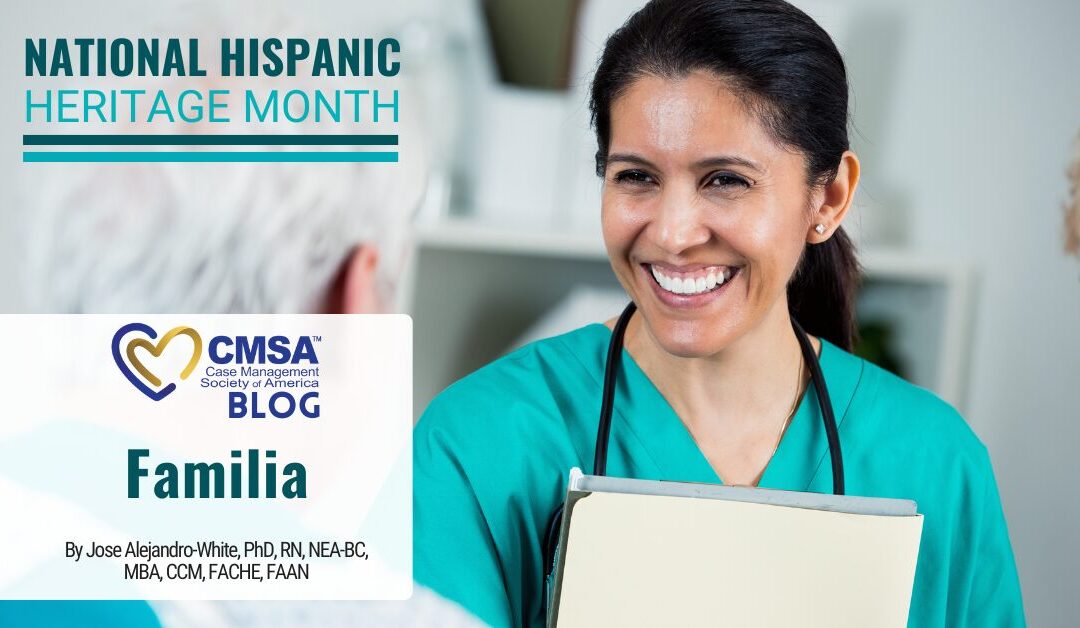By Jose Alejandro-White, PhD, RN, NEA-BC, MBA, CCM, FACHE, FAAN
It is fitting that National Hispanic Heritage Month is celebrated from September 15 to October 15. The 30-day period celebrates family traditions and independence in several Latin/Hispanic countries: Costa Rica, El Salvador, Guatemala, Honduras, Nicaragua, and Mexico. It’s a time of remembrance and an opportunity to reembrace our rich heritage (patrimonio).
As the youngest child of my family of 13 siblings, my grandmother taught me and my brothers and sisters the importance of family being responsible and looking out for one another. As a nursing professor, I continue to hear my Hispanic students talk about the importance of caring for family as one of their primary reasons for choosing our profession. Serving and caring for individuals is an indelible part of our heritage. This is a very special trait that connects our passion to purpose.
So, we have this innate willingness within our culture to serve, but there continue to be socioeconomic barriers to becoming a licensed nurse. These social determinants result in a misalignment of care delivery diversity to the neighbors we serve within our communities. Approximately twenty percent of the U.S. population is Hispanic (U.S. Census, 2024). However, only 9% of registered nurses and 6% of nurse practitioners are Hispanic (Bureau of Labor Statistics, 2024). Although the percentages are gradually improving, they are much too slow.
Culturally competent care is critical because it bridges the gap between healthcare providers and patients from diverse backgrounds and builds trusting relationships. Individuals and families are more likely to feel understood and comfortable when treated by someone who speaks their language, understands their cultural upbringings, and shares similar life experiences. This lack of diversity within the nursing profession can lead to miscommunication, mistrust, and, ultimately, poorer health outcomes for Hispanic patients. Therefore, increasing Hispanic representation in nursing is not just about creating opportunities for individuals; it’s about improving the quality of care for entire communities.
Addressing these disparities will require a multifaceted approach. First, we must work to reduce the financial barriers that prevent many Hispanic students from pursuing nursing degrees. This could include increased scholarships, grants, and other financial aid targeted at underrepresented students. Additionally, mentorship programs that pair aspiring Hispanic nurses with professionals in the field could provide invaluable guidance and support. Lastly, institutions must make concerted efforts to recruit and retain Hispanic students and faculty, creating a pipeline that ensures the next generation of nurses better reflects the diversity of our nation.
In conclusion, National Hispanic Heritage Month is a time to celebrate our cultural contributions and reflect on the challenges that still exist for Hispanic communities. The values of family, service, and care central to our heritage perfectly align with the nursing profession. Yet, socioeconomic barriers continue to limit our representation in healthcare. By addressing these barriers, we can ensure that the next generation of nurses is as diverse as the communities they serve—leading to better health outcomes for all.
References:
Bureau of Labor Statistics. (2024). Retrieved from: https://www.bls.gov/cps/cpsaat11.htm
U.S. Census Bureau. (2024). Retrieved from: https://www.census.gov/quickfacts/fact/table/US/PST045221
Join us next Wednesday, October 9 at 2pm ET for the highly anticipated panel, "Making the Case: Strategies to Showcase Your Value." Register NOW and secure your spot: https://www.pathlms.com/cmsa/courses/78033%20
1 Hour Pre-Approved CEs: RN, SW, CCM, CDMS, CNLCP
Discover the key strategies and techniques that case managers can use to effectively communicate their value — beyond their departments. From building stronger relationships to advocating for your profession, this webinar will equip you with actionable insights to elevate your role in healthcare.
Bio: Dr. Alejandro-White joined UT Southwestern Medical Center as a Nurse Scientist on Aug 7, 2023. Jose currently serves as a Lieutenant Colonel in the US Army Reserves. He previously held senior health administration roles within the Department of Veteran Affairs, University of California Irvine Health, Tampa General Hospital, and Parkland Health & Hospital System. Dr. Alejandro-White was the 15th President of the National Association of Hispanic Nurses (2012-2014) and the 25th President of the Case Management Society of America (2018-2020). Jose is active in professional associations, including Treasurer (2019-2023) of Sigma Theta Tau; Texas Nurses Association (2023-2026), and the American Association of Men in Nursing (2022-2024). He has previously served on the boards of the American Academy of Nursing, ANA California, and Florida Nurses Association. Dr. Alejandro-White is a Fellow of the American Academy of Nursing and a Fellow of the American College of Healthcare Executives.


Great blog Dr. White. I don’t think we often think about how underrepresented and the disparities among healthcare workers. Bringing awareness helps to bring issue to the forefront. Because I work in such a diverse system I truly did not realize that the Hispanic representation in healthcare specifically nursing was so low. Thanks.